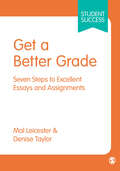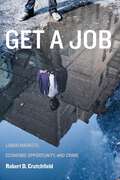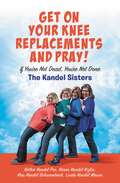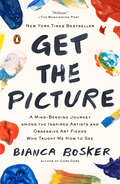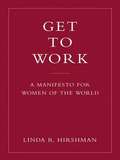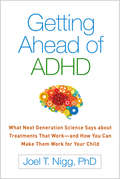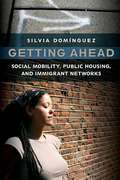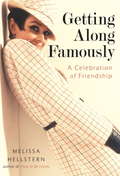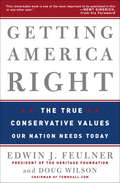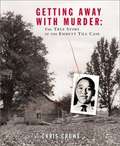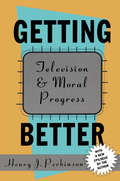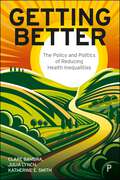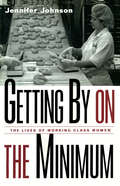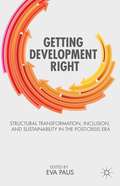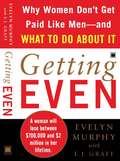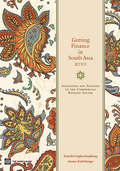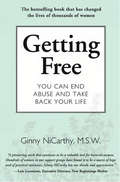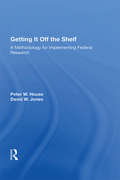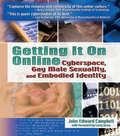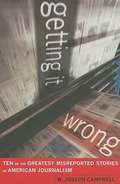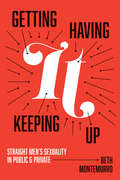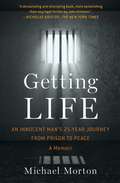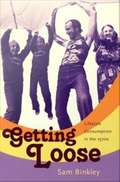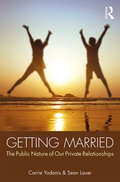- Table View
- List View
Get a Better Grade: Seven Steps to Excellent Essays and Assignments (SAGE Study Skills Series)
by Denise Taylor Professor Mal LeicesterNot sure how to start your essay or prepare for a presentation? Worried about how to structure your report? Questioning what a good assignment actually looks like? With encouraging, jargon-free advice and a clearly defined seven-step plan to getting better grades, this book takes the fear out of academic writing and gives you the tools you need to succeed. Punchy and packed with the dos and don’ts of good writing, it helps you improve your grades quickly and with minimal hassle. Covering not just essays, but also group work, reports, reviews, research projects, journaling, and presentations, it provides effective tips on: Defeating writers’ block Identifying and using relevant sources Planning and outlining strategies Building arguments and providing evidence Developing critical and analytical thinking Cultivating writing style Mastering presentation. Focused on explaining and demonstrating the core requirements of academic assignments through detailed examples, this book provides all the support you need to build confidence and produce high-quality assignments. SAGE Study Skills are essential study guides for students of all levels. From how to write great essays and succeeding at university, to writing your undergraduate dissertation and doing postgraduate research, SAGE Study Skills help you get the best from your time at university. Visit the SAGE Study Skills hub for tips, resources and videos on study success!
Get a Job: Labor Markets, Economic Opportunity, and Crime (New Perspectives in Crime, Deviance, and Law #11)
by Robert D. CrutchfieldAre the unemployed more likely to commit crimes? Does having a job make one less likely to commit a crime? Criminologists have found that individuals who are marginalized from the labor market are more likely to commit crimes, and communities with more members who are marginal to the labor market have higher rates of crime. Yet, as Robert Crutchfield explains, contrary to popular expectations, unemployment has been found to be an inconsistent predictor of either individual criminality or collective crime rates. In Get a Job, Crutchfield offers a carefully nuanced understanding of the links among work, unemployment, and crime. Crutchfield explains how people’s positioning in the labor market affects their participation in all kinds of crimes, from violent acts to profit-motivated offenses such as theft and drug trafficking. Crutchfield also draws on his first-hand knowledge of growing up in a poor, black neighborhood in Pittsburgh and later working on the streets as a parole officer, enabling him to develop a more complete understanding of how work and crime are related and both contribute to, and are a result of, social inequalities and disadvantage. Well-researched and informative, Get a Job tells a powerful story of one of the most troubling side effects of economic disparities in America.
Get on Your Knee Replacements and Pray!: If You're Not Dead, You're Not Done
by Kris Kandel Schwambach Karen Kandel Kizlin Kathie Kandel Poe Linda Kandel MasonBlending humor and faith, the four Kandel sisters encourage senior adults to be mission focused and never let age block opportunities to serve and minister to others.With wry humor, they inspire you to investigate possibilities for your next assignment from God. If you have retired or are considering retirement, you will chuckle as they motivate you to look into new opportunities to serve God with that unhinged schedule, wisdom gained from experience, and perhaps even some discretionary income.Cheerleaders encouraging the no-longer-young to stay in the game, the Kandels let you laugh out loud at their own real-life mishaps. They prove that age isn't years, it is mind-set, and they offer a lighthearted challenge to seek new ways to serve God.Do not let your number of birthdays stand in the way of your eternal impact. The big music for intentional, mission-focused living can begin even when you are well advanced in years.
Get the Picture: A Mind-Bending Journey among the Inspired Artists and Obsessive Art Fiends Who Taught Me How to See
by Bianca BoskerAN INSTANT NEW YORK TIMES BESTSELLERNAMED A BEST BOOK OF 2024 BY NPR, TIME, AND THE ECONOMIST&“Get the Picture is one of the funniest books I&’ve read . . . Brilliant.&” —The Washington Post &“A gripping and often hilarious investigation into the art world. . . . Bosker goes full Tom Wolfe.&” —TIME &“Funny, whip-smart, and gorgeously written, Get the Picture will forever transform the way you see. . . . I loved every word.&” —Suleika Jaouad, New York Times bestselling author of Between Two Kingdoms The New York Times bestselling author of Cork Dork takes readers on another fascinating, hilarious, and revelatory journey—this time burrowing deep inside the secretive world of art and artistsAn award-winning journalist obsessed with obsession, Bianca Bosker&’s existence was upended when she wandered into the art world—and couldn&’t look away. Intrigued by artists who hyperventilate around their favorite colors and art fiends who max out credit cards to show hunks of metal they think can change the world, Bosker grew fixated on understanding why art matters and how she—or any of us—could engage with it more deeply.In Get the Picture, Bosker throws herself into the nerve center of art and the people who live for it: gallerists, collectors, curators, and, of course, artists themselves—the kind who work multiple jobs to afford their studios while scrabbling to get eyes on their art. As she stretches canvases until her fingers blister, talks her way into A-list parties full of billionaire collectors, has her face sat on by a nearly-naked performance artist, and forces herself to stare at a single sculpture for hours on end while working as a museum security guard, she discovers not only the inner workings of the art-canonization machine but also a more expansive way of living.Probing everything from cave paintings to Instagram, and from the science of sight to the importance of beauty as it examines art&’s role in our culture, our economy, and our hearts, Get the Picture is a rollicking adventure that will change the way you see forever.
Get to Work: . . . And Get a Life, Before It's Too Late
by Linda R. HirshmanRead Linda Hirshman's posts on the Penguin Blog.Does changing a toddler 's diapers count as a fulfilling job? Is the glass ceiling that keeps women from advancing in their careers actually located in the home? In Get to Work, a book that instantly ignited a firestorm of debate, Hirshman cogently argues that "opting out" of the workplace is a form of self-betrayal. Combining a hard-hitting critique of traditional feminism with practical advice to help stay-at-home moms find satisfying, well-paying work, this book will be as era-defining as The Feminine Mystique.
Getting Ahead of ADHD: What Next-Generation Science Says about Treatments That Work—and How You Can Make Them Work for Your Child
by Joel T. NiggDoes toxic pollution cause attention-deficit/hyperactivity disorder (ADHD)? What about screen use? Are alternative treatments worth exploring? Can dietary changes help? From leading ADHD researcher Joel T. Nigg, this book presents exciting treatment advances grounded in the new science of epigenetics--how genes and the environment interact. Distinguishing unsupported, even dangerous, approaches from bona fide breakthroughs, Dr. Nigg describes specific lifestyle changes that have been proven to support the developing brain. Vivid stories illustrate ways to maximize the positive effects of healthy nutrition, exercise, and sleep, and minimize the damage from stress and other known risk factors. The book helps you figure out which options hold the most promise for improving your child's symptoms and overall well-being--and gives you step-by-step suggestions for integrating them into daily life.
Getting Ahead: Social Mobility, Public Housing, and Immigrant Networks
by Silvia DominguezHonorable Mention, 2014 Distinguished Contribution to Research Award presented by the Latina/o Sociology Section of the American Sociological Association Getting Ahead tells the compelling stories of Latin-American immigrant women living in public housing in two Boston-area neighborhoods. Silvia Domínguez argues that these immigrant women parlay social ties that provide support and leverage to develop networks and achieve social positioning to get ahead. Through a rich ethnographic account and in-depth interviews, the strong voices of these women demonstrate how they successfully negotiate the world and achieve social mobility through their own individual agency, skillfully navigating both constraints and opportunities.Domínguez makes it clear that many immigrant women are able to develop the social support needed for a rich social life, and leverage ties that open options for them to develop their social and human capital. However, she also shows that factors such as neighborhood and domestic violence and the unavailability of social services leave many women without the ability to strategize towards social mobility. Ultimately, Domínguez makes important local and international policy recommendations on issue ranging from public housing to world labor visas, demonstrating how policy can help to improve the lives of these and other low-income people.
Getting Along Famously
by Melissa HellsternWhere would we be without our friends? If we are truly fortunate, we each have one special friend in our lives-the one who cheers every accomplishment no matter how small, who lifts spirits in even the darkest hour, and who knows our deepest secrets and will never tell. In a look at six of the most iconic best friends of our time, bestselling author Melissa Hellstern crafts a charming celebration of strong women and the enduring bonds that unite them. With pairs like Audrey Hepburn and Sophia Loren, Coco Chanel and Madame Misia Sert, and Julie Andrews and Carol Burnett, Getting Along Famously brings these famous friendships down to earth and explores the precious the art of friendship and the many forms it takes. These women walked the world side by side building friendships that not only withstood all the joys and sorrows of life, but often encouraged them to reach the top of their professions. Whether through laughter or tears, these dynamic relationships illuminate the importance of friendship in every woman's life. Part surprising biography, part tribute to the unique bonds of friendship, Getting Along Famously will remind you of your delight in your own friends and is the perfect book to share with those woman that mean so much you choose to call them family.
Getting Along Famously
by Melissa HellsternWhere would we be without our friends? If we are truly fortunate, we each have one special friend in our lives--the one who cheers every accomplishment no matter how small, who lifts spirits in even the darkest hour, and who knows our deepest secrets and will never tell. In a look at six of the most iconic best friends of our time, bestselling author Melissa Hellstern crafts a charming celebration of strong women and the enduring bonds that unite them. With pairs like Audrey Hepburn and Sophia Loren, Coco Chanel and Madame Misia Sert, and Julie Andrews and Carol Burnett, Getting Along Famously brings these famous friendships down to earth and explores the precious the art of friendship and the many forms it takes. These women walked the world side by side building friendships that not only withstood all the joys and sorrows of life, but often encouraged them to reach the top of their professions. Whether through laughter or tears, these dynamic relationships illuminate the importance of friendship in every woman's life. Part surprising biography, part tribute to the unique bonds of friendship, Getting Along Famously will remind you of your delight in your own friends and is the perfect book to share with those woman that mean so much you choose to call them family.
Getting America Right: The True Conservative Values Our Nation Needs Today
by Edwin J. Feulner Doug WilsonWhere did we take a wrong turn? That's what proud conservatives are asking. The era of liberal dominance is finally over, but sometimes you wouldn't know it. Government spending is out of control, huge waves of illegal immigration endanger our security and our American identity, more and more Americans look to Washington for the "quick fix," the government grabs for more power at the expense of our liberty, American businesses are fleeing overseas, and terrorism threatens us more than ever. How do we deal with these crises when our leaders refuse to? By following Edwin J. Feulner and Doug Wilson's unique and practical six-point plan: specific steps that every one of us can take to put America back on course. As conservative leaders--Feulner as president of the nation's preeminent think tank, The Heritage Foundation; Wilson as chairman of America's leading conservative news and community website, Townhall. com--the authors know that what will rescue us now are the things that have always made this nation great: free enterprise, limited government, individual freedom, traditional American values, a strong national defense, and the rule of law. We must demand accountability and a return to our core principles. Getting America Right reveals: * Stunning real-world examples of government run amok, and how it hurts you * The politicians who are selling out, and the brave souls who are fighting for what's right * How to restore fiscal discipline among Washington's pork-addicted pols--Feulner and Wilson identify ridiculous programs we should slash now * The blueprint for getting the federal government out of our way and out of our pockets * The threats Washington is ignoring, and the steps we must take at home and abroad to ensure our security * What you can do to hold politicians accountable What is at risk if we fail? Nothing less than the freedom, prosperity, and security of ourselves and our children and grandchildren. We must get it right--each and every one of us. And we need to start today. As Newt Gingrich writes in his foreword to Getting America Right, "The blueprint for our action--yours and mine--is contained within the pages of this remarkable book. " Also available as an eBook. Visit GettingAmericaRight. com for more resources to join the fight to put America back on track.
Getting Away with Murder: The True Story of the Emmett Till Case
by Chris CrowePresents a true account of the murder of fourteen-year-old Emmett Till in Mississippi in 1955.
Getting Better: Television and Moral Progress
by Bryan GreenEver since the fifties, when television became ascendent in American popular culture, it has become commonplace to bemoan its "bad" effects. Little or nothing, however, has been said about its "good" effects. With this observation, Henry Perkinson introduces his provocative and original analysis of television and culture. Rejecting the determinism inherent in most studies of the effects of television ("We are what we watch"), he insists that it is people that actively change culture, media having no agency to do so. Nevertheless, he argues that television did facilitate the changes we have made in our culture over the past thirty years.Perkinson describes how television helped us become critical of our existing culture, especially of the relationships that were commonly accepted between men and women, blacks and whites, politicians and voters, employers and employees, and between people and the environment. These criticisms have brought about dramatic changes in our social, political, and economic arrangements, as well as changes in our intellectual outlook. Since these changes came about through our efforts to eliminate or reduce discrimination, suffering, and injustice, Perkinson argues that our culture has become more moral in the age of television.In what amounts to a history of recent social change in America, Getting Better examines the role television has played in the rise of feminism, the black protest movement, the presidential elections, the Vietnam War, Watergate, environmentalism, religious fundamentalism, and the New Age movement. This book will be essential reading for students of communications and American culture, and for anyone who wants to make sense of the transformations of American life from the 1950s to the present. Even those who do not agree that things are "getting better" will find that Perkinson's analysis helps to make things more coherent.
Getting Better: The Policy and Politics of Reducing Health Inequalities
by Clare Bambra Julia Lynch Katherine E. SmithAvailable open access digitally under CC-BY-NC-ND licence. Health inequality has reached a crisis point. Your income or hometown can have a devastating impact on how well and how long you live. This injustice, exacerbated during the COVID-19 pandemic, continues as the cost of living rises and other sources of inequity grow. What can be done to make things better? This book, written by the authors behind the award-winning The Unequal Pandemic, explores successful international case studies of governments reducing health inequalities – from the USA and Brazil to Germany and England – stretching over fifty years from the 1960s to the 2000s. Essential reading for students and scholars of public health and the social sciences, and for health and social care professionals and policy makers, this book demonstrates that reducing health inequalities is possible and provides a roadmap for today’s governments to follow.
Getting By on the Minimum: The Lives of Working-Class Women
by Jennifer JohnsonFirst published in 2002. Routledge is an imprint of Taylor & Francis, an informa company.
Getting Development Right
by Eva PausThe celebratory tone about the emergence of the BRICs and the improved growth in Sub Saharan Africa and Latin America during the 2000s obscures the reality that, for large parts of the developing world, the development challenges are more acute than ever before. After three decades of Washington Consensus policies, deepening globalization, and China's and India's increasing competitiveness in ever more goods and services, many developing countries are now facing three critical challenges: how to engender a transformation of the production structure that creates many more productive jobs, how to make growth more inclusive, and how to stimulate a growth process compatible with environmental sustainability. This book brings together development scholars and practitioners from multiple academic disciplines and policy perspectives to analyze important facets of this triple challenge, to explore interconnections among them and suggest strategies for overcoming the challenges in the current age of globalization. Three features distinguish this book from other current works in the field. First, this book looks beyond the current global crisis and short-term growth opportunities and analyzes the challenges to development from a long-term perspective. Second, books on the barriers to development tend to concentrate on one of the three challenges, e. g. Barbier (2010) A Global Green New Deal on environmental sustainability; Cimoli, Dosi, Stiglitz (2009) Industrial Policy and Development on structural transformation; and Milanovic (2011) The Have and the Have-Nots on exclusion. This book, in contrast, brings the three challenges together to emphasize that they challenges are interlinked and that strategies and policies must begin to recognize these interconnections to address different aspects of the challenges concomitantly. Finally, the contributors to the book include some of the most renowned development thinkers of our time.
Getting Even
by E. J. Graff Evelyn MurphyAre you (or a woman you love) being cheated out of 33 percent of your earnings? If you're a woman, over your working lifetime you will lose between $700,000 and $2 million -- simply because of your sex. Is that fair? No. Can it be stopped? Absolutely. The wage gap is a steady drain on the daily lives of women and our families. Rarely do we step back and add up what's missing -- better medical treatment, child care, housing, food, or retirement savings that women could have afforded if they were paid as well as men. Getting Even exposes the discrepancy between what women and men make -- and how it affects us all. It reveals that the wage gap is not going away on its own. And it explains how to close the wage gap -- and, finally, get women even. In this intelligently argued and startling book, Evelyn Murphy, Ph.D., humanizes the numbers through real-life stories and a wealth of data that has never before been examined. She shows how the wage gap pinches the daily lives of families throughout the country, at every economic level and in every industry. And she explains why, even though women have more opportunities than their mothers did, the wage gap persists: The American workplace still harbors an astonishing amount of discrimination, including blatant as well as complex hidden barriers, unspoken assumptions, unexamined attitudes, and habitual ways of behaving. But Murphy also brings good news: The wage gap can be closed. Having served as an economist, politician, public official, and corporate officer, she has a 360-degree view of the problem -- and of the solution. In a book that will explode into public debate, Murphy issues the indictment, rouses us to action -- and tells us exactly how to get even.
Getting Finance in South Asia 2010: Indicators and Analysis of the Commercial Banking Sector
by Anoma Kulathunga Kiatchai SophastienphongUtilizing standardized indicators from 2001 to 2008, 'Getting Finance in South Asia 2010' analyzes the financial performance and soundness of commercial banks in eight South Asian countries: Afghanistan, Bangladesh, Bhutan, India, Maldives, Nepal, Pakistan, and Sri Lanka. While the indicators cannot predict the onset of a financial crisis, their analysis has identified specific weaknesses in regional financial sectors that should be addressed by the supervisory authorities. In this current edition of the annual 'Getting Finance' publication, two new development dimensions -- payment systems developments and savings mobilization -- have been added to the six dimensions covered in the previous edition: access to finance, performance and efficiency, financial stability, market concentration and competitiveness, capital market development, and corporate governance. This edition also expands the country coverage to include Afghanistan, Bhutan and Maldives. New benchmark countries have also been added, including emerging countries from outside OECD. In addition to analyzing the 'Getting Finance' indicators, the book also discusses the challenges facing South Asian banks and the impact of the global financial crisis on their operations. The new material in this edition enables readers to have a more holistic perspective of the indicators in South Asia and a better understanding of the financial systems in the region. 'Getting Finance Indicators 2010' reaffirms the World Bank's commitment to working with developing member countries to promote financial sector development and create financial systems that are sound, stable, supportive of growth and responsive to people's needs.
Getting Free: You Can End Abuse and Take Back Your Life (New Leaf)
by Ginny NicarthySince its first publication, Getting Free has provided a lifeline for thousands of women seeking to free themselves from abusive relationships. With uncomplicated yet motivational language, this book contains all the tools and advice you need to help yourself recognize, respond to, and overcome domestic violence. Practical information is partnered with special exercises designed to identify patterns of behavior - and to ultimately help you make decisions about your life and your future. Each chapter provides solid solutions for issues related to a variety of topics, including emotional abuse, child abuse, financial stability, legal issues, love and fear, same-sex abuse, teen abuse, guilt, and safety - from planning a safe escape to staying safe long after you leave. Book jacket.
Getting It Off The Shelf: A Methodology For Implementing Federal Research
by Ernest R HouseIn 1976, the federal government spent over $10 billion on civilian research, development, and demonstration projects. The vast majority of these dollars were spent for applied research-research from which it is reasonable to expect a payoff in implementation, commercialization, or problem solving. In all too many cases, that payoff has not been for
Getting It On Online: Cyberspace, Gay Male Sexuality, and Embodied Identity
by John Edward CampbellLearn how gay men use Internet technologies to connect with others sharing their erotic desires and to forge affirming communities online! Getting It On Online: Cyberspace, Gay Male Sexuality, and Embodied Identity examines the online embodied experiences of gay men. At once scholarly and sensual, this unique book is the result of a three-year ethnographic study chronicling the activities on three distinct social scenes in the world of Internet Relay Chat (IRC)-virtual spaces constructed by gay men for the erotic exploration of the male body. Examining the vital role the body plays in defining these online spaces offers insight into how gay men negotiate their identities through emerging communication technologies. The author combines a critical look at the role of the body in cyberspace with candid accounts of his own online experiences to challenge conventional views on sex, sexuality, and embodied identity. Getting It On Online provides an inside look at three specific online communities-gaychub (a community celebrating male obesity), gaymuscle (a community formulated around images of the muscular male body), and gaymusclebears (a space representing the erotic convergence of the obese and muscular male bodies emerging out of the gay male "bear" subculture)-in an effort to unsettle those models of beauty and the erotic depicted in more mainstream media. The book demonstrates how the social position of these men in the physical world in regards to age, race, gender, class, and physical beauty influences their online experiences. Far from a realm of bodiless exultation, Getting It On Online illustrates how the flesh remains very much present in cyberspace. Getting It On Online examines topics such as: why people chat online the history of IRC (Internet Relay Chat) how people construct their identities in cyberspace how some online spaces function like virtual gay bars the concept of online disembodiment the role the body plays in online social relations the future of online communication ethnographic research in cyberspace mediated images of the male body and the gay male beauty myth and much more! Getting It On Online: Cyberspace, Gay Male Sexuality, and Embodied Identity is an essential resource for anthropologists, sociologists, and psychologists; academics working in gender studies, queer theory, cultural studies, and cyber-culture studies; and anyone interested in gay and lesbian issues and/or cyberspace.
Getting It Wrong: Ten of the Greatest Misreported Stories in American Journalism
by W. Joseph CampbellW. Joseph Campbell addresses and dismantles prominent media-driven myths--stories about or by the news media that are widely believed but which, on close examination, proves apocryphal.
Getting It, Having It, Keeping It Up: Straight Men’s Sexuality in Public and Private
by Beth MontemurroScholars and social critics are looking at gender and sexuality, as well as masculinity, in new ways and with more attention to the way cultural ideologies affect men’s and women’s lives. With the rise of an online “incel” (involuntarily celibate) community and the perpetration of acts of violence in their name, as well as increased awareness about the complexities of sexual interaction brought to the fore by the #metoo movement, it has become critical to discuss how men’s sexuality and masculinity are related, as well as the way men feel about the messages they get about being a man. Prior research on masculinity and masculine sexuality has examined the experiences of adolescent boys. But what happens to boys as they become men and as many move away from homo-social environments into sexual relationships? What happens when they no longer have a crowd of peers to posture or perform for? How do their sexual experiences and sexual selves change? How do they prove their masculinity in a society that demands it when they are no longer surrounded by peers? And how do they cultivate sexual selves and sexual self-confidence in a culture that expects them to always already be knowledgeable, desiring sexual subjects? In Getting It, Having It, Keeping It Up, Beth Montemurro explores the cultivation of heterosexual men’s sexual selves. Based on detailed, in-depth interviews with a large, diverse group of heterosexual men between the ages of 20 and 68, she investigates how getting sex, having sex, and keeping up their sex lives matters to men. Ultimately, Montemurro uncovers the tension between public, cultural narratives about hetero-masculinity and men’s private, sexual selves and their intimate experiences.
Getting Life: An Innocent Man’s 25-Year Journey from Prison to Peace
by Michael Morton“A devastating and infuriating book, more astonishing than any legal thriller by John Grisham” (The New York Times) about a young father who spent twenty-five years in prison for a crime he did not commit…and his eventual exoneration and return to life as a free man.On August 13, 1986, just one day after his thirty-second birthday, Michael Morton went to work at his usual time. By the end of the day, his wife Christine had been savagely bludgeoned to death in the couple’s bed—and the Williamson County Sherriff’s office in Texas wasted no time in pinning her murder on Michael, despite an absolute lack of physical evidence. Michael was swiftly sentenced to life in prison for a crime he had not committed. He mourned his wife from a prison cell. He lost all contact with their son. Life, as he knew it, was over. Drawing on his recollections, court transcripts, and more than 1,000 pages of personal journals he wrote in prison, Michael recounts the hidden police reports about an unidentified van parked near his house that were never pursued; the bandana with the killer’s DNA on it, that was never introduced in court; the call from a neighboring county reporting the attempted use of his wife’s credit card, which was never followed up on; and ultimately, how he battled his way through the darkness to become a free man once again. “Even for readers who may feel practically jaded about stories of injustice in Texas—even those who followed this case closely in the press—could do themselves a favor by picking up Michael Morton’s new memoir…It is extremely well-written [and] insightful” (The Austin Chronicle). Getting Life is an extraordinary story of unfathomable tragedy, grave injustice, and the strength and courage it takes to find forgiveness.
Getting Loose: Lifestyle Consumption in the 1970s
by Sam BinkleyFrom "getting loose" to "letting it all hang out," the 1970s were filled with exhortations to free oneself from artificial restraints and to discover oneself in a more authentic and creative life. In the wake of the counterculture of the 1960s, anything that could be made to yield to a more impulsive vitality was reinvented in a looser way. Food became purer, clothing more revealing, sex more orgiastic, and home decor more rustic and authentic. Through a sociological analysis of the countercultural print culture of the 1970s, Sam Binkley investigates the dissemination of these self-loosening narratives and their widespread appeal to America's middle class. He describes the rise of a genre of lifestyle publishing that emerged from a network of small offbeat presses, mostly located on the West Coast. Amateurish and rough in production quality, these popular books and magazines blended Eastern mysticism, Freudian psychology, environmental ecology, and romantic American pastoralism as they offered "expert" advice--about how to be more in touch with the natural world, how to release oneself into trusting relationships with others, and how to delve deeper into the body's rhythms and natural sensuality. Binkley examines dozens of these publications, including the Whole Earth Catalog, Rainbook, the Catalog of Sexual Consciousness, Celery Wine, Domebook, and Getting Clear. Drawing on the thought of Pierre Bourdieu, Zygmunt Bauman, and others, Binkley explains how self-loosening narratives helped the middle class confront the modernity of the 1970s. As rapid social change and political upheaval eroded middle-class cultural authority, the looser life provided opportunities for self-reinvention through everyday lifestyle choice. He traces this ethos of self-realization through the "yuppie" 1980s to the 1990s and today, demonstrating that what originated as an emancipatory call to loosen up soon evolved into a culture of highly commercialized consumption and lifestyle branding.
Getting Married: The Public Nature of Our Private Relationships (Sociology Re-Wired)
by Carrie Yodanis Sean LauerIn Getting Married, Carrie Yodanis and Sean Lauer examine the social rules and expectations that shape our most personal relationships. How do couples get together? How do people act when they’re married? What happens when they’re not? Public factors influence our private relationships. From getting engaged to breaking up, social rules and expectations shape and constrain whom we select as a spouse, when and why we decide to get married, and how we arrange our relationships day to day. While this book is about marriage, it is also about sociology. Yodanis and Lauer use the case of marriage to explore a sociological perspective. Getting Married will bring together students’ academic and social worlds by applying sociology to the things they are thinking about and experiencing outside of the classroom. This book is a useful tool for many sociology courses, including those on family, gender, and introduction to sociology.
